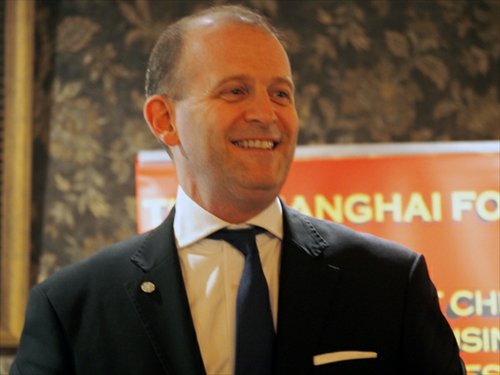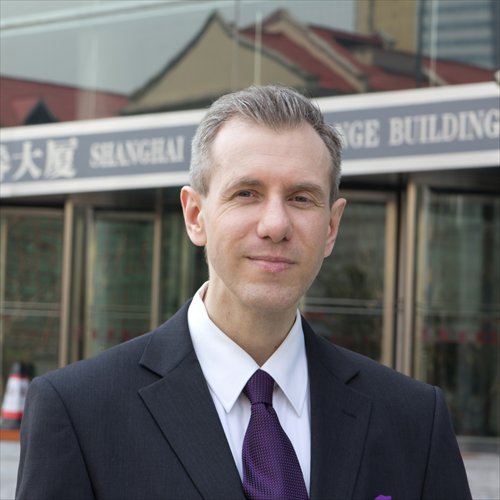How to make money? – There’s no stock answer, say the experts

Author Andrew Stotz gives a lecture at the Shanghai Forum Meetup series. Photo: Courtesy of Jason Inch
"How can I learn how to get rich in the stock market?"
Even people skeptical about getting rich quickly can be forgiven for pondering this question, especially in a country where the primary stock index has surged nearly 150 percent over the past year.
It is a question financial analyst, entrepreneur and author Andrew Stotz received some time ago from one of his nieces. As Stotz tells the story, his initial response wasn't especially encouraging.
"I said, you won't get rich in the stock market," he told the Global Times on June 2.
He then listed the reasons why someone like her should stay away from picking stocks.
"You're pretty much an amateur. You don't know anything. You're probably not that interested in the stock market, really. You don't have time. So, you're not going to get rich in the stock market. Unless…," he said, trailing off.
Stotz said the advice that followed this "unless" became the foundation for his book, which he was promoting that night at The Book Room cafe in Jing'an district. He was invited to speak by the Shanghai Forum Meetup series, a series of lectures about business, finance and economics for young professionals in Shanghai, explained Jason Inch, the group's organizer.
Stotz's book has one of those titles that start provocatively, but end up sounding pretty reasonable. It's called You won't get rich in the stock market … until you change the way you think about it.
Based on Stotz's lecture, the book provides readers with the basics of investing for the long term, while keeping risks to a minimum. He encourages people to plan for their retirements far in advance, to add money regularly to their investment portfolios, stick to low-cost investments and abstain from buying individual stocks or other risky financial products.
He argues that this is the only safe path for people who aren't professional investors to get rich in the stock market.
It's an argument that might seem quaint to anyone who started investing in the Chinese mainland markets over the last 12 months. Mainland stocks have been soaring. But share prices have been rising so fast that it is easy to ignore just how unusual this latest run has been.
Here's a quick example. The Shanghai Composite Index, one of the primary gauges of mainland stocks, rose 8.92 percent during the first week of June. By comparison, the S&P 500 went up 11.4 percent over all of 2014 - by most accounts an excellent year for US stocks.
The situation has led to repeated warnings that the mainland markets are poised for a sudden and severe correction.
Although it is difficult for individual foreign investors to invest in mainland stocks, the story of the mainland market's rise has grabbed the attention of at least some of Shanghai's expats. One foreigner who attended Stotz's lecture said she attended the lecture specifically because she was interested in investing in mainland stocks. (She was disappointed to learn how difficult this was.)
It left us wondering how Shanghai's expats manage their personal investments and whether they, too, were interested in investing in the mainland markets.

Andrew Stotz, financial analyst, the US
In Asia, you find it is really hard to find cheap ways to invest. The alternatives are very limited and there isn't a lot of competition. Actually, China's not bad. If you look around Asia, it's really expensive to invest in some countries.
My objective for the book was for it to be an all-in-one manual that would allow people to start managing their own money. But what you'll find is that in most countries in Asia, your best option is to get your money out of them. The idea is to get your money into a place like Hong Kong or Singapore. These are very developed markets where you do have the ability to get access to some of the financial products I talk about, which are just mutual funds and ETFs that have low fees.

Matt Christensen, student, the US
Living abroad can complicate investing because you're always worried about the tax laws, moving money between countries and bank accounts, making sure you're not taxed doubly for money you make overseas, while living overseas. So in that sense, I'm not too eager to invest here. Most of my financial accounts are still in the US. The only thing I have here is a local bank account, which I keep for convenience.
A few years ago - when I was working full time - it was a different situation and I was investing a lot more. These days I am investing in my education.
I teach English to MBA students at the same university where I'm studying. All of them are young professionals. Over the last year, they've all been investing in the stock market. They're really excited and have been posting nonstop on WeChat about how much money they've been making. So, it's hard to watch that and not be a little interested.
At the same time, one of the concerns I have is I don't see a lot of Chinese stocks that pay dividends. I think a lot of these companies are raising capital and sitting on cash. I don't see these companies investing or paying dividends. So they're raising cash just to have cash. And that's disconcerting.You've got a lot of cash now, but what are you going to do with it?
That's something I ask my students about. But they're all in it for the game. The hype is big now. They're excited.
A year ago, I would've said the market was undervalued, but it is getting to the point where I'm looking at it, thinking that it's not sustainable.
I guess the weakness in the housing market is one of reasons why stocks are so attractive now. Chinese investors don't have a lot of options. My MBA students say: "I can either buy an apartment or put my money into stocks. Stocks are going up; they are cheaper than apartments. I'm going to do that."
It's going from one bubble to another. And that's how I feel about it. I try to point out that rational, but they just say: "What else can we do?"

Marina Linnik, relocation services, Russia
I have a middling level of knowledge about investing. I have educated myself on these matters. And I have a degree in finance. So I know, more or less, how to invest. I know about options, stocks, bonds, government bonds, company bonds, the concept of compound interest, and the regularity at which you have to do it. So, intellectually, I know a lot, but I don't implement it 100 percent.
I invested in my education and in property. And I spend of course. And I invest a lot in myself, like education, health - not the material stuff - more like things to increase my value.
I don't think I have the time and energy to invest in Chinese stocks. As I understand it, you need to think about it every day. I need something more long-term that does't require a lot of effort.

Jason Inch, organizer, Shanghai Forum Meetup series, Canada
At the Shanghai Forum event series one of our goals is to help young professionals in the city understand economic, business and finance in China. In talking to our forum participants, I found there were a lot of questions about whether and how to invest in the Chinese stock market.
In my book, China's Economic Supertrends, I recount the stock market rise and fall from 2007 to 2009.
Today I believe that China is a great place to invest in, but when picking companies you should consider the macroeconomic trends. For example, in 2008 I suggested investing in social media companies and e-commerce such as Tencent and Taobao. Recently I suggest investors look at environmental products and services as one of the biggest growth areas for China's economy in the next five years. With China's policy emphasis on clean energy, battery technology, electric cars and high-speed rail, China will be the world leader in most clean tech sectors by the end of the decade.